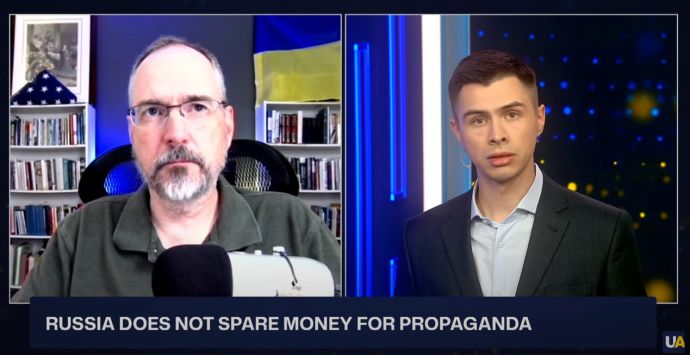The US elections are on the horizon and the Kremlin will use all its leverage to destabilize the US.
Russian RT international broadcaster invested money into an American media company, subsequently hiring popular influencers with large audiences to rebroadcast Russian narratives. Professor @Professor-Gerdes talked to us in this episode about the uncovered Russian information influence scheme.
How Russian propaganda tries to influence the American population and how to distinguish truth from fakes?
Interview with Darin Gerdes, professor of business in Charleston Southern University, author of YouTube channel “Professor Gerdes Explains”.
— I would like to ask you about the fight against Russian propaganda in the U.S. in particular. We have this Department of Justice investigation with Tenam Media being at the center of this scandal and major U.S. influencers being involved in these manipulations. What can you say about this? Was is unexpected?
— Yeah, so it appears that the Russians have actually learned and grown organically in how they’ve been conducting this propaganda. They’ve done this in multiple countries, including Europe and the United States.
A great book on this subject is Putin’s Playbook by Rebecca Koffler, where she talks about what they’re trying to accomplish—essentially, to sow division and discord wherever possible.
They’ve evolved from just one guy in St. Petersburg pushing disinformation to actually getting authentic users involved. This change makes it more credible when it comes from a real person.
The big question is whether those authentic users really believe the narratives they’re pushing or if they’re being influenced or even paid by Russia. We don’t know which is this.
— It’s a natural integration of Russian propaganda into influencers—YouTubers, Instagram, and Facebook creators—who now claim they were victims of an information operation. But clearly, they were distributing Russian narratives for money, right?
— Yes, they were getting brand sponsorships, and they should’ve known that the money was disproportionate. I saw Tim Pool being interviewed by Ben Shapiro—both are conservatives. I’m a conservative too, but an old Reagan-style conservative who fully supports Ukraine.
There’s a branch within the Republican Party, the isolationist wing, that has grown, especially among Trump supporters. Even before the invasion, some conservatives were claiming that it wasn’t Putin’s fault, but rather that neocons were pushing for war.
Some might align with Russian narratives because it matches their beliefs, or they might be influenced unknowingly. Either way, they are pushing Russian narratives, which is clear.
— Is there a natural way to counter this? The best way to counter propaganda is to prevent it from spreading. What do you think we can do?
— That’s a tough question. In the U.S., we have a very strong free speech culture, so it’s difficult to stop falsehoods from spreading. The hope is that the truth will beat out the falsehoods, but mainstream media barely covers Ukraine anymore, and only a few YouTubers are regularly reporting on the war.
So, it’s a pitched battle? Ironically, because RT (Russia Today) was pushed off major platforms, it went underground.
You can still find RT on its own site, but it’s not as visible as before. Now, they’ve adapted and use social media influencers to spread their narratives. Now it`s harder to counter them, as it was earlier.
One thing we can do is show the Russian narratives and then debunk them. That’s what I do on my channel—break down what Russian media says and explain the truth.
It’s essential that we keep debunking these narratives. I talk to people who unknowingly repeat Russian talking points, like, “Why should we be involved in Ukraine? That’s far away, and we have our own problems.” But this conflict is crucial. It could escalate into something far more dangerous.
Even people I know who are conservative repeat these points without realizing they’re echoing Russian propaganda. They worry about World War III, but that’s why we need to support Ukraine—so we avoid it.
So, it’s an uphill battle, but Ukraine’s entire struggle has been uphill.
Everything Ukraine has faced has been an uphill battle, and yet, here we are, 900 days into what was supposed to be a three-week “special military operation.” We can do it.
Read also: The US Marine Scout Sniper’s Personal Story. Interview with Matthew Sampson










